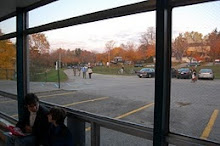Yale University economist Robert Shiller, pioneer of Standard & Poor’s/Case-Shiller home-price index, said there’s a good chance housing prices will fall further than the 30% drop in the historic depression of the 1930s. Home prices nationwide already have dropped 15% since their peak in 2006, he said.
Some people think that because real estate prices have fallen it means that the bust is over. It certainly is not. For it to be over, prices have to return to parity with rents. We are moving in that direction but are not there yet. I suspect the value/rent ratio will overshoot below historical averages just as it overshoot above averages on the way up.
In addition to the value/rent ratio decreasing, rents are depressed by the increase in housing units without a corresponding increase in people needing housing.
Two other factors complicate the real estate market
- There are ghost neighborhoods of empty housing units all in the same area. Their existence may affect the market more than the same number of empty units mixed randomly with occupied housing.
- In some states the laws prevent banks from collecting the deficit balance if a foreclosed house does not cover the loan. There has been a lot of speculation, often self-serving speculation on the part of people who made the loans, that could cause large numbers of foreclosures among people who are fully capable of paying their bills.
Inflation hurts bondholders, but it won't hurt holders of mortgage backed bonds very much, because the value of their bonds decreased along with the value of the real estate collateralizing them.
But what about the Treasury? It's yield is low thanks to a flight to quality. If my inflation prediction holds true, however, we might see the Treasury yield rise significantly.
The politicians running for president are calling for new programs and no new taxes on the middle class. If borrowing becomes more expensive, that won't be an option.


No comments:
Post a Comment